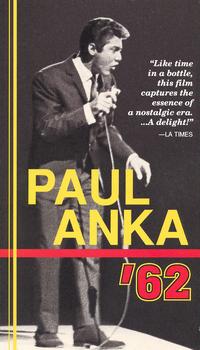fiction.wikisort.org - Movie
Lonely Boy is a 1962 cinéma vérité documentary about the former teen sensation Paul Anka. The film takes its name from Anka's hit song, "Lonely Boy", which he performs to screaming fans in the film. This short documentary makes use of hand-held cameras to record intimate backstage moments.
| Lonely Boy | |
|---|---|
 VHS cover | |
| Directed by | |
| Produced by | Roman Kroitor |
| Starring | Paul Anka |
| Edited by | John Spotton |
| Distributed by | National Film Board of Canada |
Release date | May 25, 1962 (Ann Arbor Film Festival) |
Running time | 27 minutes |
| Country | Canada |
| Language | English |
Co-directed by Roman Kroitor and Wolf Koenig, this National Film Board of Canada production won a Canadian Film Award as Film of the Year at the 15th Canadian Film Awards, and was nominated at the BAFTA Awards for its best short film prize.
Influence
Lonely Boy was a substantial influence on the Peter Watkins film Privilege. Watkins had studied it in preparation for filming[1] and his film deals with the phenomenal popularity of a pop singer and its abuse for political motives. One scene showing the central character, Steven Shorter, at a table with a venue owner is virtually a one-to-one reproduction of a scene in Lonely Boy, even using the same name (Uncle Julie) for the like-mannered venue owner. The cinéma verité style of Lonely Boy was also adopted, and one DVD release of Privilege included Lonely Boy as well as an excerpt of an essay on that film as extra features.[2] The film's importance in the evolution of documentary film making was explored in the film Cinéma Vérité: Defining the Moment.[3]
References
- Peter Watkins, Part 2, Films, Privilege.
- Privilege at DVD Verdict.
- Greg Bennett "Hidden Gem: ‘Privilege’" Archived 2012-04-05 at the Wayback Machine At The Cinema, March 29, 2011 - Crow, Jonathan (2013). "Cinema Verite: Defining the Moment (1999)". Movies & TV Dept. The New York Times. Baseline & All Movie Guide. Archived from the original on 20 December 2013. Retrieved 24 November 2013.
External links
- Lonely Boy at IMDb
- Lonely Boy at AllMovie
- Watch Lonely Boy at NFB.ca
- Media Rights entry
Другой контент может иметь иную лицензию. Перед использованием материалов сайта WikiSort.org внимательно изучите правила лицензирования конкретных элементов наполнения сайта.
WikiSort.org - проект по пересортировке и дополнению контента Википедии